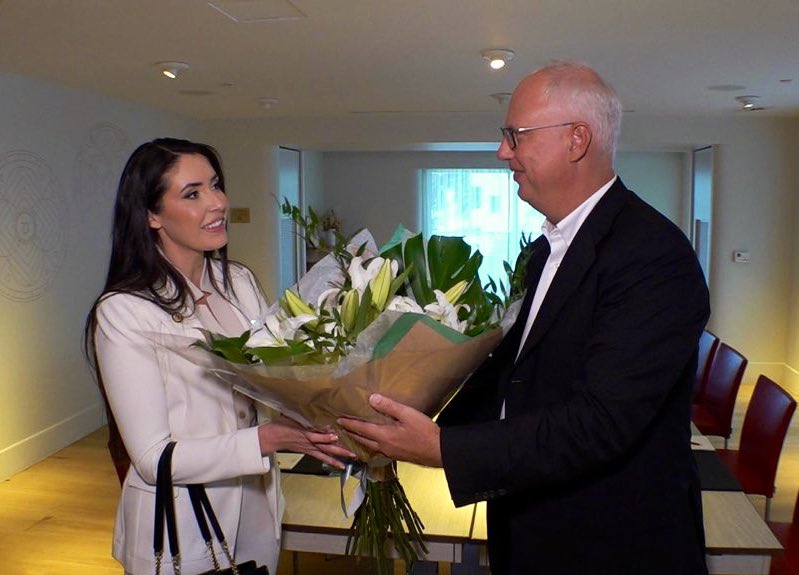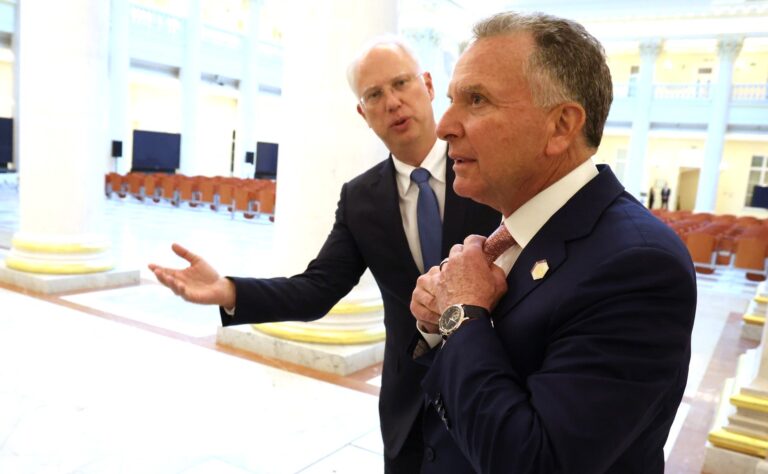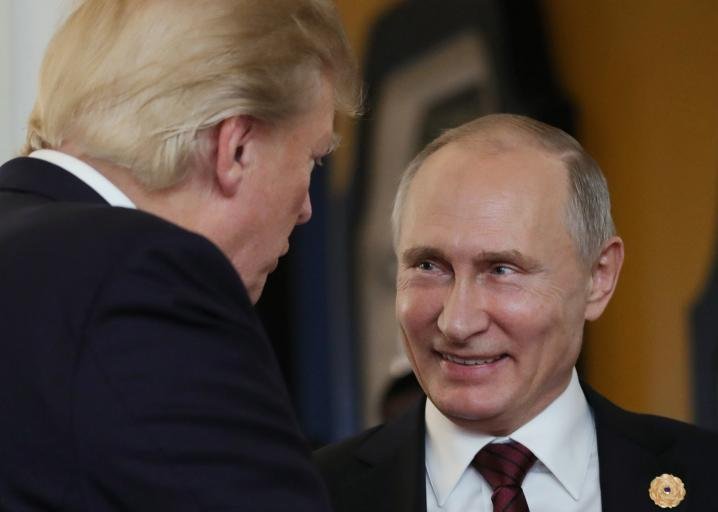The diplomatic fiasco of Vladimir Putin’s special envoy Kirill Dmitriev has already taken place—and is irreversible. Yet he continues to seek a way back into the game, betting on propaganda tools and manipulation of public opinion while exploiting the theme of searching for “peaceful solutions” to end Russia’s war against Ukraine.
Not long ago, the Russian president’s special representative for investment and economic cooperation with foreign states was regarded as a rising star in Putin’s circle.
In February 2025 he was appointed to a high-profile position and included in the official delegation to conduct Russian–American negotiations, receiving permission to travel to the United States. Putin tasked him with cultivating relations with the Trump administration on investment and economic matters. His mission was to reopen access for Russian business to the American market and undermine the sanctions regime imposed on Russia since 2014.
The Kremlin expected significant achievements from Dmitriev, convinced he had strong contacts within Trump’s team, allegedly through his ties to Goldman Sachs. But in practical terms, the Kremlin favorite—helped along by Putin’s “old guard”—proved at best a disappointment and at worst an international lightweight. His October trip to the United States resembled a diplomatic swan song. Dmitriev increasingly looks like a downed pilot feigning intense media activity, turning into a routine propagandist who echoes Putin, hoping to regain his favor.
Dmitriev’s Black October
After Trump announced sanctions against Russian oil giants such as Rosneft and Lukoil, the Kremlin attempted to neutralize the fallout by sending Dmitriev to Washington. At the start of the trip, he felt confident, claiming he had come at the invitation of the American side. He tried to create the impression that he carried some “trump cards.”
In reality, all the leverage belonged to Trump, who authorized total disregard of Putin’s envoy. Dmitriev was effectively devalued, causing Putin yet another international humiliation.
The best Dmitriev managed was a handful of meetings with U.S. officials, including Florida Republican congresswoman Anna Paulina Luna and Special Presidential Representative Steve Witkoff. His main outcome was giving interviews to American media outlets.
His objective was to promote the narrative that “pressure doesn’t work on Russia,” that the U.S. must “respect Moscow’s interests,” abandon value-based policy, and embrace “pragmatism” in the form of joint economic projects.
One of the more outlandish elements of his media campaign were boxes of chocolates decorated with quotations from Vladimir Putin—an act that looked like open mockery of the American audience.
In addition to peddling the familiar line that sanctions have “no impact” on the Russian economy, Dmitriev also interfered in U.S. domestic politics by saying Russia would “tell the Trump administration not to become like the Bidens,” and not repeat “wrong approaches of the past.”
A core Kremlin narrative was Dmitriev’s claim that Ukraine was “sabotaging necessary dialogue on European orders,” thereby attempting to absolve Russia of responsibility for derailing the Trump administration’s peace initiatives developed over more than eight months.
Through congresswoman Luna, Dmitriev tried to promote the idea that “business is business”—trade must continue, dialogue must be maintained, and the West should turn a blind eye to Russia’s war of aggression in Europe that is destroying global security and the rules-based international order.
Dmitriev not only failed to persuade Washington—he triggered a wave of criticism from the White House.
U.S. Treasury Secretary Scott Bessent sharply attacked him, labeling Dmitriev a “Russian propagandist.” Bessent openly ridiculed Dmitriev’s statements that energy sanctions “will not affect Russia at all” and will only raise gasoline prices for Americans.
He stressed that the Russian economy is a wartime economy with near-zero growth and inflation over 20%, trends that will eventually force Putin to negotiate.
The U.S. Permanent Representative to NATO, Matt Whitaker, categorically rejected contact with Dmitriev, calling the visit “incompetently organized in every sense,” and describing its results as “pathetic and worthless.”
To improve his catastrophic position, Dmitriev even resorted to veiled and direct criticism of his opponents.
A Duel Between Dmitriev and Lavrov
We are convinced that Dmitriev’s visit effectively ended his diplomatic career. This is welcome news for those in Foreign Minister Sergey Lavrov’s camp, who has been in conflict with Dmitriev, questioning his competence, methods, and standing in the Kremlin.
The situation is further complicated by uncertainty over Lavrov’s own future after the failure to arrange a Putin–Trump meeting in Budapest. Lavrov’s openly undiplomatic exchanges with U.S. Secretary of State Marco Rubio caused the collapse of a key diplomatic opportunity for Putin, who seeks a way out of Russia’s international isolation while maintaining the façade of “peace efforts” regarding Ukraine.
The Kremlin has been demonstrably punishing Lavrov for deviation from Putin’s script. Lavrov was absent from a Security Council session and barred from heading Russia’s delegation to the G20 summit.
Meanwhile, Dmitriev has been covertly funding media campaigns against Lavrov, trying to portray him as an outdated relic who must step down. The weaker Dmitriev becomes, the harder he tries to drag Lavrov down with him.
Yet the collapse of Dmitriev’s U.S. mission is Lavrov’s strongest card before Putin.
Despite his temporary isolation, Lavrov still belongs to Putin’s Politburo—even though his role has long been reduced to ceremonial.
The Dmitriev–Lavrov conflict illustrates intra-elite warfare inside the Kremlin, where propaganda instruments serve as balancing tools. Dmitriev, refusing to concede defeat, has opened a new front—this time in the information sphere.
From Failed Envoy to Hyper-Loyal Propagandist
Although Dmitriev wages a covert war against Lavrov, he does not hesitate to use public propaganda to impress his master, Putin. His political technologists are crafting an image of him as an absolutely loyal Kremlin soldier and carrier of Putin’s ideology in all directions.
Dmitriev selectively interprets Donald Trump’s statements—highlighting only quotes portraying Putin as a “strong leader who must be taken seriously,” or suggesting Washington should delay sending Tomahawk missiles to Ukraine or avoid discussing frozen Russian assets.
On 20 November, the White House approved a bill introducing new sanctions against Russia. Senator Lindsey Graham stressed that the bill allows secondary sanctions and tariffs on imports from countries buying Russian uranium, gas, and oil.
Thus, the foundations of Russia’s influence—its inherited Soviet-era dominance in oil and gas—are collapsing. Dmitriev bears responsibility for this failure.
Ukraine is urging European allies to take a political decision on a $163 billion “reparations loan” backed by frozen Russian assets. Brussels is close to adopting the measure, and the Trump administration has no objections.
Dmitriev’s Final Delegitimisation
Kirill Dmitriev is now a fully delegitimized political figure.
Can he still be viewed as someone capable of participating in serious initiatives to resolve Russia’s war against Ukraine?
The leak to Axios of yet another “peace plan” allegedly drafted with Dmitriev’s participation appears to be a desperate attempt to return to the big game, proving his supposed influence over Witkoff and his diplomatic viability.
But analysis of the hastily prepared proposal shows it is simply a new wrapper around old Putin ultimatums—a propaganda tool to rehabilitate Dmitriev.
It is clearly another attempt to create a rift between the United States, Ukraine, and European partners—none of whom were consulted. This “peace product” is doomed to fail, just like the political career of its co-author.
Dmitriev’s activities also distance Trump from any chance of winning the Nobel Peace Prize, sending signals to Washington that are not aligned with Brussels, European allies, or Kyiv. The process becomes a one-sided push for Ukrainian capitulation.
Moreover, the U.S. has effectively accepted Russia’s rules by excluding competent foreign-policy agencies from decision-making. This allows Moscow to keep the so-called “peace process” at the level of propaganda—promoting its desired outcome while discrediting official Washington as a side willing to support Russia’s position without coordination with allies.
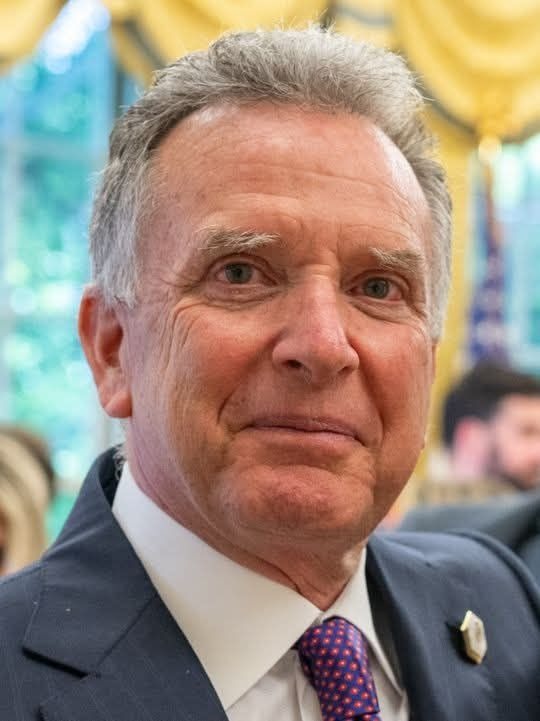
More on this story: Special Envoy Steve Witkoff: Peacebroker or Pawn of Russian Interests?
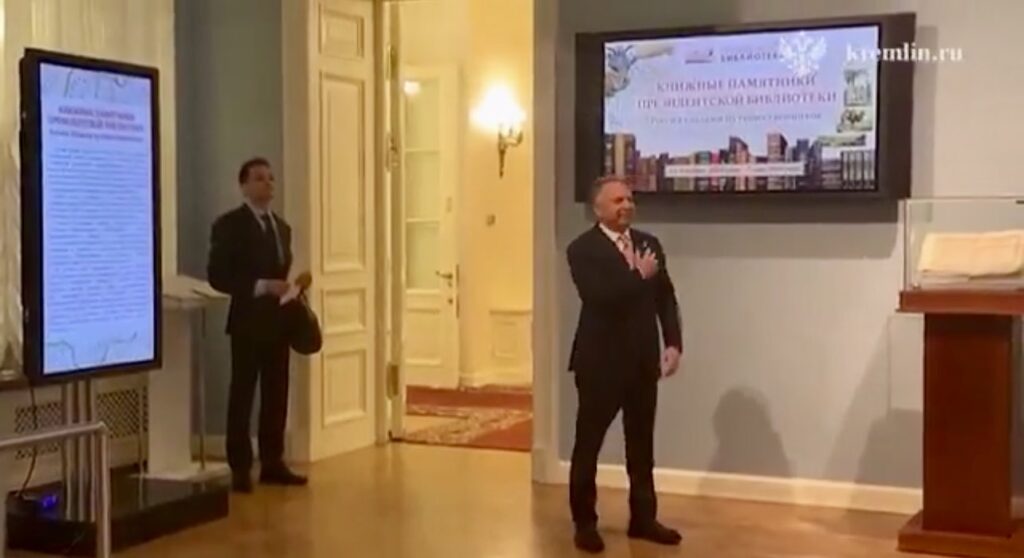
More on this story: Analysis: Outcomes of the Witkoff Visit to Moscow
